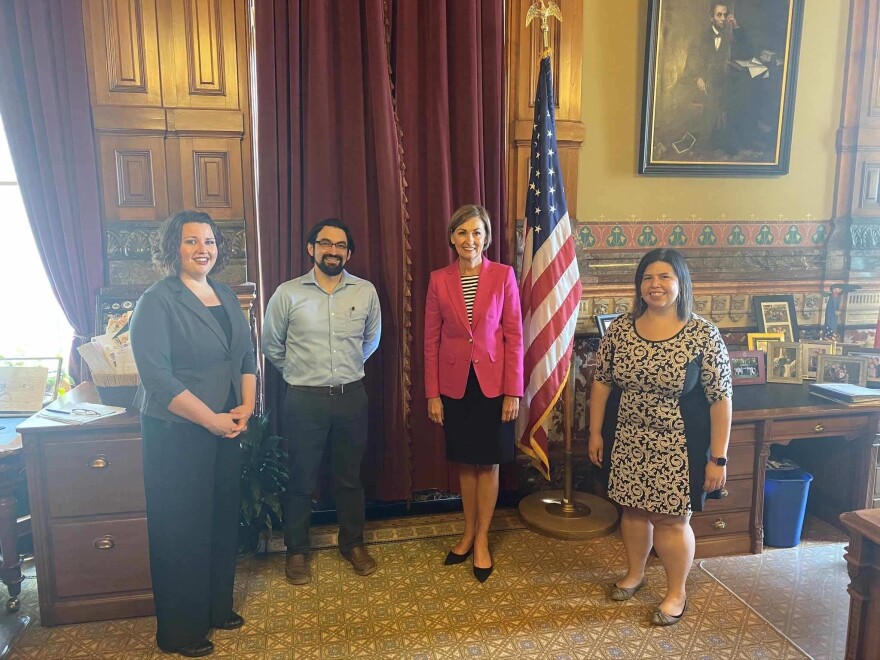COVID-19 has disproportionately affected those in the Black and Latino communities. For Latinos, this may be due in part to the information available in their native language. Some of the Spanish-speaking population in Iowa is staying up to date, thanks to two people.
Gov. Kim Reynolds hosted COVID-19 briefings starting in April. The people who gave her a voice in Spanish are Vanessa Marcano-Kelly and Ernest Nino-Murcia. They are interpreters and translators, which means they work with both spoken word and written. They communicated all things COVID to the Spanish speakers in Iowa during the governor’s press conferences.
They started interpreting the briefings through Iowa PBS four weeks after they began. That’s when the state realized there was a big need to provide information to those who can’t speak English or don’t speak it fluently. People like David Sixtos of Des Moines.
“There are more and more Latinos every month, right? And it is important to communicate all of the news, what is happening, how many are infected, all of that, right?" Sixtos said through an interpreter. "It's very very important because we have to be aware of the updated information and that way no one can try other things or bring other resources that have not been implemented or approved by the state of Iowa.”
Sixtos is originally from Morelia, Michoacan, a state in central Mexico. He is a part-time pastor at Casa del Alfarero, a part of la Iglesia de Dios Pentecostal M.I. He watched the Spanish press conferences and said without interpreters, many times Spanish-speakers instead get their information from social media. And social media isn’t always the most accurate.
Interpreter/translator Vanessa Marcano-Kelly used social media when she noticed how many Iowans either didn’t have information, or didn’t have the right information. And when it comes to a global pandemic, it’s extremely important for all communities to understand how to keep themselves, and others, safe.
“People don't know what to do. People are being laid off. People don't know what's going on. They don't know the impact of this virus," Marcano-Kelly said.
Marcano-Kelly started by translating public health documents after work hours and posting on her Facebook page. The Iowa Office of Latino Affairs then connected her with Iowa PBS and a team devoted to interpreting the governor’s state COVID updates. They also brought on Ernest Nino-Murcia to help.
“This wasn't something where, you know, you just show up five minutes before going on the air and just kind of wing it, especially at the very beginning that was a big job," Nino-Murcia said.
Nino-Murcia and Marcano-Kelly spent up to two hours before each press conference studying current events in Spanish, refreshing their vocabulary and adding to their running glossary of COVID-related terms they created from scratch. They compared interpreting live-to-tape to constant problem solving.
Both interpreters stressed the amount of work that goes in to accurately communicating important information, especially during the time of COVID.
“When you look at the stakes of what we're interpreting, people are making decisions as to you know, how they're going to protect themselves where they're going to go, are they going to go to work," Nino-Murcia said.
But the weight on their shoulders isn’t just based on the work itself. They also need to balance what their role is in the community.
“I wouldn't call myself like an authority on things, but I was pretty well-informed," Marcano-Kelly said. "And I knew what was happening as it was said and the numbers and everything so it was, I think that it was for me, I had to step back a little bit from some of the community work that was happening like after hours, especially because I knew some information that was going to be said or like at a different date.”
Nino-Murcia and Marcano-Kelly are prepared for when they need to step up again. This seems even more likely as Iowa sees a new increase of COVID-related deaths and infections. Nino-Murcia said he and Marcano-Kelly are “ready and willing to come back.”
This comes as good news for people like Sixtos.
“Our essential calling is to serve our community. How excellent that we are involved more and more in what’s happening in the state of Iowa. And we know more about what’s going on when there’s an interpretation," Sixtos said.
Both interpreters look forward to the day where they can work on communicating crisis messages, and they also want to do positive news for the state.



